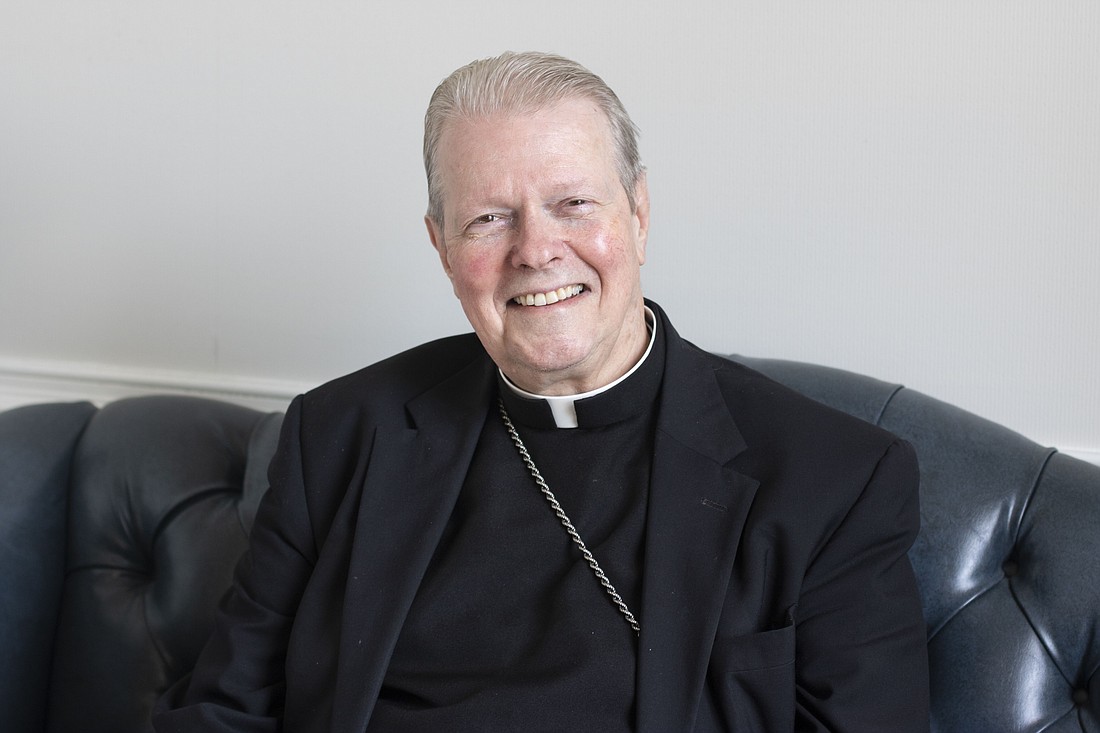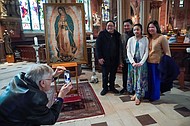May 4, 2023 at 12:00 a.m.
Jesus our safe space
It’s all about the heart. His heart in our hearts. “God is love,” as Saint John writes, “and whoever remains in love remains in God and God in him” (1 Jn 4:16). That the essence of God is love can be learned from revelation itself, which discloses the trinitarian nature of God as three divine Persons, equal yet distinct, revolving about each other, pazzo d’amore (“crazy in love”), as Saint Catherine of Siena phrases it, for all eternity. The love between the Father and Son eternally generates the Holy Spirit, the love between the Father and the Son, modeling that uniquely God-like union that we call marriage. “God created mankind in his image; in the image of God he created them; male and female he created them” (Gn 1:27).
It is our experience of all forms of creative activity, especially art, that something of the artist is revealed or at least hinted at in the painting, or the poem or the song. That two human beings, equal but different are the source, by and through each other, that other human beings, different but equal, come into being, and are, no less, able to express and enhance their mutual love through this pro-creative act — for it is God who infuses the soul to form the whole person! This celebrates the triune love of God in the most dramatic yet fully human way. In this way a family, rooted in this divine love, can discover through experience something of the familial essence of God.
God is so much more than some “guy in the sky,” an impersonal “force” or a creative “principle,” a prime mover or first cause. Such descriptions may tell us something about what God does, but not who God truly is. God’s love is personal within God’s very nature, and personal toward us, an eternal invitation to be “caught up” in this dance. This passion of God to share with us the very depths of divine identity and, in the process, invite us to discover our own deepest identity in this divine image that we are, lifts us up beyond the labels and stereotypes that we can so easily become entangled by.
It is true that at conception we receive a distinctive genetic code. There has never been and will never be another you or we. As different and as numerous as grains of sand and flakes of snow, we are unique in and for all eternity. Our incarnate, fleshly reality, which our souls inform, has its own chromosomal structure which is stamped through our bodies, so that even the organs of men and women, though functionally similar, are marked by their xx or xy codes throughout. We do not choose these identifiers, any more than our racial makeup, our nationality or ethnicity or, for that matter, who our biological parents are. Yet, as different as each of us may be, similar in some ways and diverse in others, we are united by one reality common to every human being. Each one of us is a child of God, loved by this infinite, all-embracing heart at the center of all creation from whom all creation flows.
The metaphor that Jesus uses at the beginning of the 10th chapter of Saint John’s Gospel, which was proclaimed at all the Masses last Sunday, the Fourth after Easter, is that of a sheep gate. In this same chapter we will hear Jesus speaking of himself as the “good shepherd.” He reveals the depth of his love by the extent to which he, as that good shepherd, will risk his own life to rescue the lost sheep, even to the point of laying down his life. Literally. Setting the stage for this narrative, he also speaks of himself as the sheep gate, that safe space or passage through which the sheep can come and go to find pasture and security. No one who enters through this gate is ever lost, ignored or cast aside.
A few matters are worth contemplating for a moment. We know how true the metaphor is to the reality of how far Jesus extended himself into the depths of where humanity has fallen. No form of execution was more painful or humiliating than the crucifixion he suffered. It was designed that way by the Romans. Jesus is saying to us that no matter how low we may have gone or have been cast by our own sins or been bullied by those of others, no matter what addiction we are imprisoned by or what dark place we may have wandered into like a lost sheep, he will meet us there to lift us up and bring us home to his heart. Discouragement is not an option for anyone who takes him at his word. No one will be snatched away or lost who comes to him, for this is the very reason that he came into the world (cf. Jn 10:28-29).
The extent to which Jesus will go out to the straying sheep, the sinner in the throes of deep spiritual jeopardy, is more than a mere reconnaissance mission. It is also an action of God’s initiative to make a home in the heart of the beloved (cf. Jn 14:23). Jesus is revealing to us the depth of God’s will, the desire of the heart of the triune God, to dwell in our hearts. This is called by the theologians, the “indwelling” of the Holy Trinity, which gives rise to the popular affirmation that we are made temples or tabernacles of the Holy Spirit by virtue of our baptism.
Many of us may be tempted to write this off as something for children, even outright rejecting it as anything to be taken seriously. If we remember for a moment, however, that we are all being invited to spend an eternity in heaven, to be sainted, then we might consider that this is exactly what Jesus is trying to persuade us to accept as our vocation and to trust him to get into our hearts and to transform our lives, our hearts, minds and souls and, yes, even our bodies, for we are incarnate spirits, and our eternal destiny is to live in our glorified bodily state, just as the risen Christ preceded us in.
God is not impressed by our sins or, for that matter, the excuses we make for putting off his help in freeing us from them. Jesus waits patiently, knocking gently at the door of our hearts, for us to open up his loving and transforming presence, to “transition,” to use a popular word these days into our true identity that reflects what we are, much deeper than our labels or moods or attempts to present ourselves to others through the ever-changing masquerades of sex, money and power, which the world devises. All of them are truly transitional, for they do not last. No lies do.
It is worth remembering the words of Saint Paul. “But God proves his love for us in that while we were still sinners Christ died for us” (Rm 5:8). No, not just remembering, but taking those words to heart. For it is all about the heart. The heart of God living in our hearts. This is what makes our faith come alive. Cardinal Francis E. George, OMI, former Archbishop of Chicago, once wrote: “Orthodoxy is necessary, but not enough; the devil is orthodox. He knows the catechism better than anyone … but he will not serve, he will not obey.” This is the satanic pride that refuses to let God be God, to let ourselves be loved, even ravished by that love, falling into the safe space of the One who cannot and will not ever let us down.
In simple terms, I suppose it could be said that this is the ultimate conceit — and deceit — that control, our control, will somehow magically save us from ourselves. It is the very first and, really, the only temptation that the evil one continues to propose to the human race as the serpent in the Garden of Eden posed to Adam and Eve (“you will be like God”). How ironic when the true way to be like God is to love as God loves, with total abandon, as Jesus shows us in giving his will over to the loving will of the Father. This is the choice that freed him to fulfill his mission as the Savior of the World. It is also the choice that we are invited to make to free us to inherit eternal life, to live as the citizens of heaven that we are truly called to be. To be saints. May our prayer for “safe home” be, “Lord Jesus, I trust in you!”
Follow Bishop Ed on Twitter @AlbBishopEd






Comments:
You must login to comment.